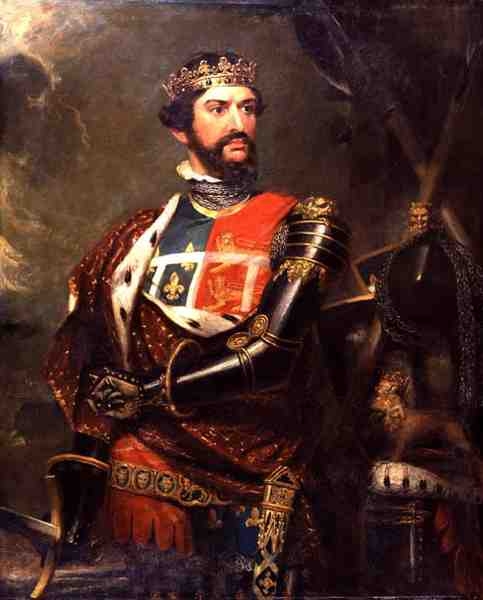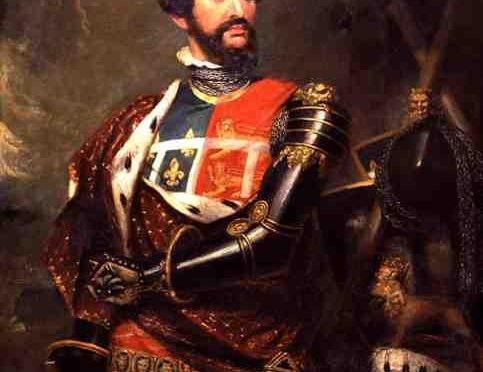Looking back at the history of Europe, it is amazing how what we view today as solid political borders and national identities often grew out of random happenstance. If Joan of England had made it to Castile to wed Peter the Cruel, instead of succumbing to the Black Death at the age of fourteen, how would the history of the Iberian Peninsula have changed? So it is with the history of the Basque Country, where political intrigue and treachery shifted the fortunes of the country and the people.

- Pedro the Cruel, sometimes also called the Just, ascended to the throne to become the king of Castile and León at the age of sixteen, reigning from 1350 to 1369. He gained a blood-thirsty reputation, notorious for “monstrous cruelty” that led to his cognomen “the Cruel.” The son of Alfonso XI of Castile and Maria of Portugal, he had a number of half-siblings through Alfonso’s relationship with Eleanor de Guzmán. The rivalry between Pedro and his half-brother Enrique of Trastámara played out over many years and shaped the future of the peninsula.
- The two half-siblings engaged in numerous battles as Enrique and his other brothers tried to dethrone Pedro. Enrique often appealed to anti-Jewish sentiment to rally support to his side. These fights ultimately led to the Castilian Civil War, which saw Pedro defeated and fleeing to Bordeaux.
- There, he enlisted the help of Edward of Woodstock, the Prince of Wales, also known as the Black Prince. On April 13, 1367, in the the Battle of Nájera, Edward’s troops defeated those of Enrique, and Pedro was reestablished on the Castilian throne. To gain Edward’s help, Pedro had promised not only large sums of money and command of his vanguard against any campaign against the Moors, but also the province of Bizkaia. Pedro also left his three daughters as hostages to guarantee fulfillment of these terms.
- Upon the defeat of Enrique, the Black Prince demanded payment, including the province of Bizkaia. Pedro responded that “Soon all of the castles and villas of Bizkaia would recognize him as sovereign.” Ultimately, however, the decision resided in the hands of the Junta General of Bizkaia. Several ambassadors were sent to Bizkaia to convince the Junta to surrender to the English, but they resolutely refused to do so. The Prince of Wales, without payment and without the Lordship of Bizkaia, eventually returned home.
Primary source: El príncipe de Gales, señor de Bizkaia, in Deia. Thanks to Joseba Desubijana for recommending this article to me.
Discover more from Buber's Basque Page
Subscribe to get the latest posts sent to your email.



Really excellent, Blas. I love this stuff, thanks for digging it up.
Sure Mark. I’m glad you enjoyed it!
Greetings,
the many interactions between Spain, England and France are complexed, fascinating and have been so for centuries.
the unification of Spain, France and other European countries is relatively new within the scope of history.
Felipe II of Spain was king of Spain from 1556-1598, later king of Portugal from 1580-1598 when he invaded from Portugal and crowed himself King of Portugal ( he took the Portuguese throne away from his Portuguese mother), King of Naples and Sicily and King of England and Ireland by marriage with his wife, Queen Mary.
Felipe V, ( of the house of Bourbon) was French, Philippe d’Anjou) the grand of Louis XIV.
What was most interesting to me, was the source of the article, particularly the wish and the dream of the Basque people to reunite the 7 Basque provinces. Personally, I do not believe that it will happen in my life time nor in the time of the Buber’s readers.
the Kingdom of Navarre was born IX–it was the only political entity that regrouped the Basque provinces under one administration. the unification lasted till the XVI century.
The conquest of the French army took Labourd and Soule. Later the Castillans won the three provinces south of the Pyrenees In 1512 and 1522, again by the Castillans, the conquest of Navarre. the only province left was Basse Navarre–and the Basse Navarre came with king from the house of d’Albret, known as Henri IV. Thes the annexation of a basque province became official. The edit 1620 states that all the posterieurs king of France are automatically King of France and Navarre.
Later, came the French revolution, in spite of the protestations of the Basque delegates, three northern Basques provinces where integrated in the Basse Navarre.
Sabino Arana, PNV, attempted to unify the Basques provinces. Today, the 7 Basque provinces are unified by the culture and the language–administratively, they are three distinct entities. Navarre has a majority of delegates and hold the purse strings.
The future of Basque unity is a dream of many Basque folks–I suspect it it will be a long dream. Time will tell.
My dream is for the covid 19 to go away so that I can return to Alava, Vitoria Gasteiz. Paz a los que llegan. Salud a los que habitan. Felicidad a los que marchan.
Saludos,
Monique
Thanks Monique. It certainly is a complicated history, more than many of us realize. Who knows what the future will bring, but hopefully, soon, we can go back and visit.